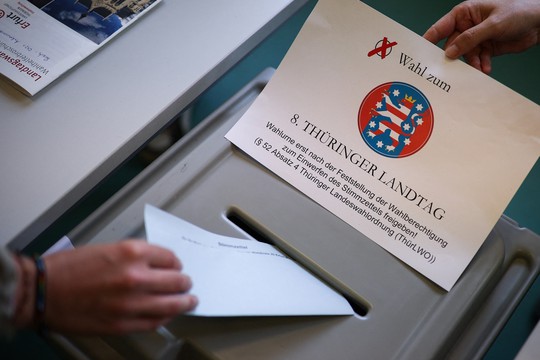The Alternative for Germany has won elections in the eastern region of Thuringia, the first time a far-right party has secured victory in a state poll in the country’s postwar history, ‘The Financial Times’ writes.
According to preliminary results, the AfD garnered 32.8 per cent in Thuringia, way ahead of all other parties. The centre-right Christian Democratic Union (CDU) was in second place with 23.6 per cent.
In the neighbouring state of Saxony the CDU won with 31.9 per cent, and the AfD came second with 30.6 per cent.
Tino Chrupalla, the AfD’s co-leader, described the party’s result in Thuringia as “sensational”.
“One thing is clear: the will of the voters is that there should be political change, both in Saxony and in Thuringia,” he said. “If you want to do credible politics, you won’t be able to do it without the AfD.”
The results are a disaster for the parties in Chancellor Olaf Scholz’s three-way coalition, with the Social Democrats, Greens and liberals all sinking to single digits in both states.
In Thuringia, the SPD had its worst result in a regional election in postwar German history, scoring just 6.1 per cent, while both the Greens and liberal FDP scored so badly that they will no longer be represented in the state parliament.
The results reflect mounting frustration in eastern Germany with a government many associate with high inflation, economic stagnation, surging energy costs and constant internecine squabbling.
Omid Nouripour, the Greens’ co-chair, described the election as a “turning point”. “People from the world of culture, people with immigrant roots, people who go to Gay Pride are really scared,” Nouripour said. “We have to stand together with them and defend democracy.”
The AfD is not the only beneficiary of local residents’ anger: they also voted in large numbers for a new far-left party, the Sahra Wagenknecht Alliance (BSW), which won 15.8 per cent in Thuringia and 11.8 per cent in Saxony.
Voters were attracted to both the AfD and BSW by their opposition to the war in Ukraine. Both parties have heavily criticised German weapons supplies to Kyiv, as well as western sanctions against Russia, and called for negotiations to bring about an end to the fighting.
The result has shown that 34 years after German reunification, a majority of people in two regions of the former communist east of the country are deeply disillusioned with the mainstream parties of the centre and frustrated with the way Germany is run.
Wagenknecht, a former communist who many see as an apologist for Russian President Vladimir Putin, has made changing Germany’s policy on Ukraine a precondition for any coalition talks.
She said her voters wanted to see “a different foreign policy in Germany”. “They want to achieve more peace, more diplomacy, and that’s our condition for [joining] a government,” she said on the German TV channel ZDF.
That has triggered outrage in the CDU, which has been steadfast in its support for Ukraine and has pressed the Scholz government, already the second-largest provider of military assistance to Kyiv after the US, to supply even more weapons.
The AfD was against Germany “being dragged into a war with Russia by some wacko western elites”.
The election campaign was also overshadowed by the August 23 terror attack in the west German town of Solingen, when a man fatally stabbed three people and injured eight others. The man, a Syrian national suspected of being a member of Isis, was arrested a day after the attack after handing himself in to police.
Both the AfD and BSW seized on the incident to claim that uncontrolled immigration had led to a surge in violent crime on German streets and to demand that asylum-seekers who have committed crimes be deported.
The disastrous performance of the three parties in Scholz’s coalition — the SPD, Greens and liberals — has led to speculation that one of them might withdraw from the government, triggering snap elections.
read more in our Telegram-channel https://t.me/The_International_Affairs

 11:21 03.09.2024 •
11:21 03.09.2024 •























